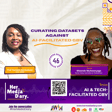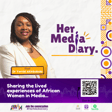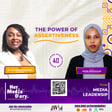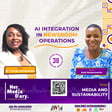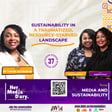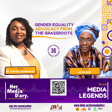Become a Creator today!Start creating today - Share your story with the world!
Start for free
00:00:00
00:00:01

SPECIAL SERIES: Labour Migration Reporting Ep 1: Contextualising labour migration on the continent
This podcast series looks at labour migration in Africa, and focuses on how women experience it on different levels.
The series focuses on gendered stories that highlight how African women experience labour migrations locally, regionally and internationally; featuring expert analysis and tips for journalists who report on labour migration issues.
Hosted and Produced by Andy Mkosi for African Women in Media
Transcript
Introduction and Partnerships
00:00:00
Speaker
Welcome to the first episode of the African Women in Media Labor Migration Podcast, a four-part series contextualizing labor migration on the continent. I am Andim Corsi, a multidisciplinary artist who is based and works in Johannesburg.
00:00:18
Speaker
African Women in Media is an international NGO with a vision that one day African women will have equal access to representation and opportunities in media industries and media content.
Historical Context and Trends
00:00:31
Speaker
And this is a limited podcast series in partnership with the Joint Labor Migration Program, the African Union Commission, International Organization for Migration, and the International Labor Organization.
00:00:50
Speaker
please check out some of our content on AfricanWomenInMedia.com and join the conversation. This episode contextualizes labor migration on the continent. We go into the historical context, trends of intracontinental and intercontinental labor migration. We focus specifically on how women experience labor migration.
Regional Labor Migration and Sectors
00:01:20
Speaker
Let's contextualize and share some history around labor migration on the continent. Globally, there were 34 million international migrants from Africa in 2015. Approximately half of these migrants were women. According to the International Labor Organization, labor migration in Africa is largely intra-regional and mainly characterized by the migration of low-skilled workers.
00:01:45
Speaker
the biggest employers of migrant labor or agriculture, wholesale and retail trade, transport and warehousing, public administration and construction. West Africa is home to the largest portion of the continent's labor force, followed by East Africa,
00:02:02
Speaker
southern Africa, north Africa, and central Africa. Of great importance in the region is the consolidation of significant south-south migration corridors to neighboring labor markets in the search for a job and better wages. Today, there are few countries not participating in migration flows, whether as countries of origin, transit, or destination.
Personal Migration Stories
00:02:25
Speaker
You can read up more on the above via our newsletter which you can subscribe to on our website africanwomeninmedia.com. The audio you are about to hear are voices of women detailing some of the experience of labour migration. Let me start by saying that I am a product of labour migration.
00:02:49
Speaker
It's affected my life in quite a significant way. Everything down to the kind of jobs that I'm able to get today and the kind of people who hire me. My parents were born and raised in Malawi and they went to school in Malawi. They both had aspirations to
00:03:10
Speaker
I suppose live better lives. My mom was born in a village called Doha. I don't know if I'm saying this right, but that's again a part of the story, I suppose. My father, however, was living in Bluntai for a while, and so obviously they, you know, Malawi has different parts, but
00:03:29
Speaker
you know, villages, cities, towns, all of those things. And so when they met, they were quite young. Well, at least my mom was in high school. And he, you know, he had a sister who was in my mom's class. So that's how they met. But they both decided
00:03:46
Speaker
This is not the place. And my father first wanted to be a doctor, so he was doing very well at school. And submissionaries had made it possible for him to study medicine in the UK. So he moved over to the UK to study medicine, and he spent a good part of 13 years there.
00:04:04
Speaker
sort of building his life again. It takes a special kind of person to uproot their lives and start again somewhere else. And I think that when people talk about migration and talk about someone wanting to find a job and better their lives in this way, they leave out the part about how brave.
00:04:22
Speaker
and how ambitious and how, you know, strong people who are willing to do this are. We always think that, you know, if someone is willing to get on a boat or put themselves in harm's way, their family is in harm's way, or at least in a lot of ways sort of leave everything behind.
00:04:40
Speaker
that they are taking risks, that they're endangering. People don't see the kind of fortitude that it takes to do this. So, you know, I always look to my parents and then think at how brave they were, you know, especially during the time where in the UK people were trying to keep Britain white. That was a lot of what the campaigning was at the time. It was a lot like South Africa, speaking of which, they moved to South Africa after I was born.
00:05:10
Speaker
in about 1989, I think it was. And so during that time as well, you know, the apartheid era was still in full swing. And my father had said that he didn't want to live and die outside of the continent. He wanted to move back.
Identity and Cultural Challenges
00:05:28
Speaker
but he wanted to be the best kind of doctor he could be. And so being in Malawi was not going to allow for that. So he said to himself and to my mom, you know, if he's going to be the best doctor he can be, he has to be where the first heart transplant was done, which was in Cape Town. So they moved to Cape Town. My sister was born here and we both have very different lives, funny enough. So,
00:05:55
Speaker
You know, my sister has become a doctor as well, followed in his footsteps. And she's, again, had to sort of travel quite a bit. She went to Peter Maritzburg for her residency. And she's been around the country, you know, just sort of learning how to be and to do. I myself have never, because I only speak English, a choice that my parents made quite early. And, you know, they were of the understanding that I would learn whatever I needed to learn if I needed to learn
00:06:25
Speaker
It's come to the point where their choice to only teach me English and take me to English schools, British schools or grammar school, has made it very easy for me to find jobs that require me to write.
00:06:42
Speaker
and speak, you know, good English. Now to this day, I've never really been hired by a South African. I've always worked for people who are from Greece, from Italy, from the States.
00:06:59
Speaker
I'm not sure if that is a direct result of my upbringing and the choices that my parents made, but it's something interesting to note. And I think that now working with touring musicians and as a journalist, particularly a scene reporter, I've had to travel quite a bit to accompany artists and to create my stories and to tell those stories. And today I've been to places like Reunion, back to Malawi,
00:07:27
Speaker
I've been to Kenya, to France, to Norway, to Nevada, the States, to Ghana. It's something that I feel
00:07:37
Speaker
very comfortable with. UK-born Malawi Bread and South Africa-based Shiba Melissa Mazaza is music journalist, media strategist, curator and podcaster working with those that value new and exciting voices across Africa. Mazaza is based in Cape Town where her family moved for career-motivated reasons.
00:07:58
Speaker
I still struggle with my connection to South Africans. There is something to be said, I think, about, I suppose, this idea of internationalism. It seems to be something that everybody aspires to in the sort of globalization of
00:08:15
Speaker
finding work and it seems like a good thing and travel is seen as a status symbol, I think, in South Africa and in a lot of parts of the world. But it's a necessity for me. If I had to stay in one place here in South Africa, I would definitely struggle, I think, to find work. I have struggled to find work. If it wasn't something that was delivered by an international company or required me to understand
00:08:41
Speaker
different countries and different peoples and connect with different countries and peoples. And I'm not sure, I'm not sure if that is a direct sort of a byproduct of the decisions that my parents made. I get the feeling that it is.
00:08:56
Speaker
And I'm not really sure what else I should say about this, but my experience, I'm grateful for the choices that they made. And I think that the way that the world is turning, there is more and more need for black women to be visible in the world. And in this way, I have been able to do that.
00:09:14
Speaker
And some might say, you know, we've forgotten where we come from and who we are. And because I don't speak to Choa the way that my parents could or used
Industry Experiences and Challenges
00:09:22
Speaker
to, that means that I might have forgotten myself or I got proud of my background, which is, you know, that is completely the opposite. I am very proud of where I come from. I'm very proud of my family's lineage. And I'm very happy to move and be moved by the different roles that I'd be taking.
00:09:43
Speaker
Zimbabwean-born singer and songwriter and music industry entrepreneur Jackie Queens is the Dorian of African female voices in modern electronica. In my experience, working in South Africa as a Zimbabwean person has been both good and bad.
00:10:03
Speaker
When I first moved to South Africa, I worked in the hospitality industry in restaurants. And this is one space where there isn't a lot of regulation in terms of what workers
00:10:23
Speaker
should be paid by law and what rights they have so often people who run restaurants tend to or rather they can be quite exploitative and there is little security when you're working as a waiter or a waitress in a restaurant and at any given time you can be fired or let go
00:10:50
Speaker
without any reason or as happened in my case, there were just a bunch of rules that were put in place that weren't exactly fair. So the restaurant owner wanted us to work as contract workers, but at the same time had put in place a bunch of rules that restricted our work outside of the restaurant. So that was one sort of bad experience that I haven't even after I left there,
00:11:20
Speaker
not many restaurants pay an hourly wage you rely on tips as a waiter or waitress so for me I suppose that's one of the things I guess that I could say is a downside of working in the hospitality industry even though at times you can make quite a bit of money depending on where you're working at the moment I work within a company within a sort of
00:11:43
Speaker
corporate setting and so far I found that to be quite interesting and at least in this sort of space there is a safety net you know in terms of legal frameworks and health insurance and all kinds of other things that ensure I get to work in a healthy environment in terms of my work is right so
00:12:07
Speaker
um at the moment I would say I'm quite happy where I am. I moved from the UK and I was moved I moved here to go to school so I mean I didn't necessarily have to use whatever qualifications I had because I was I was coming um the main reason why I was coming to South Africa was to go to university but definitely one of the things that I found
00:12:32
Speaker
was when sort of trying to find work within the hospitality industry, I would say, just being able to speak English, for example, fluently, as I do, was an advantage.
00:12:47
Speaker
getting a job so I wouldn't necessarily say that my qualifications because at the time I didn't need to present any type of paperwork in terms of qualifications like I didn't need say a qualification to get a job in a restaurant right but then definitely like when seeking work that was one of the things and
00:13:07
Speaker
obviously it's like with the sort of xenophobic sentiments in the country. It did come up from time to time, you know, how people treat people from outside of South Africa differently. But in my experience, being Zimbabwean, a lot of people say to us, oh, you guys have a very good education system. You're well educated.
00:13:35
Speaker
that kind of thing, but for the most part, that doesn't necessarily translate to being treated well. People, I think, say that a lot about migrants from other countries, not necessarily because they think that they're superior workers, but they just say that because, I mean, they can exploit them.
00:14:08
Speaker
The following voices you're about to hear are Uber drivers describing the experiences of labor migration in South Africa. South Africa is a very huge country. And so far, it has proven that it can accommodate a large quantity of people. Because if we look at the economy itself today,
00:14:35
Speaker
and the manufacturing itself. Yes. Yeah. Let's not talk about the money straight. Let's start from the manufacturing part of it. Yes. So from the manufacturing part of it, when I came to South Africa, that was in 1997.
00:14:53
Speaker
and we could change jobs from one job to another on a weekly basis. I was in the restaurant industry. So if you lose a job today, the next week you get another job. Also, if we look at the big manufacturing company like Aranda, a blanket company, we had quite a number of those factories which could accommodate all the people who were in South Africa.
00:15:19
Speaker
But now what happened is, oh, also the government of South Africa itself, it was good to the foreigners. And they were also strict, as in like you wouldn't just come to South Africa without proper documentation.
00:15:38
Speaker
So yes, it was good by that time. Yes, it was good. The government was good. We could get a good accommodation at an affordable figure food as well. We could go to ShopRite Checkers with 50 rent and you buy a meal. You buy food for the whole food for three weeks up to a month with 50 rent, which we cannot do today.
00:16:06
Speaker
So what happened was the government loosened a little bit whereby it started getting
00:16:17
Speaker
people from other nations undocumented coming into the country. So today you hear South Africans say foreigners are coming and they're taking our jobs. There is more than enough jobs for South Africans. There is more than enough jobs. So what happened is there is more foreigners who are undocumented.
00:16:42
Speaker
And those are the guys causing all this havoc and crisis. If everybody coming into South Africa was documented, properly documented, we would have enough jobs for both South Africans and foreigners in this country.
00:17:00
Speaker
But the number of undocumented people made it difficult now. For instance, I can prove it. I'm from Zimbabwe. I can take four people in my car to Zim and back to South Africa with no documents. We can cross over both borders. South African border, Zimbabwean border, same coming back. Without documents, we can do that.
00:17:22
Speaker
All we need is the money. When you pass by the borders, you just give the officials some money. Then they allow you to pass. I arrived in 2014. As I was saying, there's two kongos. One, Kungo Kinshasa, where I am from, and Kungo Brazzaville. So I crossed the river, the Congo River, from Kinshasa to Brazzaville. And I took my flight in Brazzaville.
00:17:53
Speaker
like two weeks or ten days later I flew and I landed in Johannesburg 2014 March then as I told you I was I was a banker in my country so I had a few experience and I was like okay I will try to get a another job you know the same thing but yes South Africa is not easy
00:18:19
Speaker
What type of laws do they have in place for migrants? What do you need to have in order to be in a position like the one you were in in Congo, Kinshasa?
00:18:28
Speaker
opposition what do you mean? a job like you were a banker? no you know South Africa they don't recognize other other other schools they don't recognize but I've been telling them some of it I've been telling people like look you I don't believe you need papers and I'm a bit surprised this morning I'm only talking about schools early in the morning I think it was around 5 this morning I was telling a guy that look
00:18:56
Speaker
I don't know, I'm asking myself why did I spend 19 years going to school?
Policies and Legal Frameworks
00:19:16
Speaker
Ayandam Tertwa is a journalist based in Johannesburg. She's previously worked with Health E-News, one of South Africa's leading health news publications, during her time as a student at Northwest University, pursuing her honors degree in journalism and media. She joined the online news publication Daily Maverick in 2019 as an intern and is now a reporter and editor of Maverick Kids, an insert in the publications newspaper.
00:19:43
Speaker
My name is Ayandam Tetra and I am a journalist based in Johannesburg. The course that I did for AUGIM was based on labor migration policy and impact in Africa. And what I basically tried to do with the course when I was putting it together was to package it in the sense that it becomes a tool for journalists when they want to know
00:20:12
Speaker
what policies are there in the continent that inform labor migration policy, but at the same time to know what policies are there that protect the rights of labor migrants in Africa, particularly their labor rights as well as human rights. Because some people would know that migrants face a lot of human rights violations.
00:20:41
Speaker
as they move from one country to another. And there are also labour migration rights violations that occur during the process of labour migration as well. So the legal frameworks are really important or the policies as well are really important to
00:21:03
Speaker
safeguard the rights, not only the labor rights, but as well as the human rights for migrant workers, as well as migrants as a whole. What the International Labor Organization, which is an organization that has been for many years working with various member states to help them better manage labor,
00:21:33
Speaker
laws for their specific countries. But then they also do provide policies and legal frameworks around managing labor migration, particularly. So if you are a member state of the International Labor Organization, for example, I know that my home country, South Africa, is a member state of the International Labor Organization.
00:22:02
Speaker
And there are conventions which you can regard as a less formal example of a treaty. And if you sign that convention, it is legally binding for you to go back to your home country and see how you can implement or at least
00:22:22
Speaker
have the convention filter down to your national laws. So you can think of the conventions as sort of like guidelines that are given to countries in terms of how they can manage their labor migration policy efforts, you know.
00:22:42
Speaker
If you do not have a labour migration policy law in place and you are a member state of the ILO, there are a countless number of resources, policy resources, legal resources, as well as instruments that the ILO provides to guide a member state as to how they can go about implementing labour migration policy. However,
00:23:05
Speaker
If I may add, a lot of the member states that eventually ratify or let's say adopt the convention that are set out by the International Labour Organization really and truly struggle to implement
00:23:22
Speaker
those conventions in their specific national context. In the course, I do also provide through using various resources or various research tools information as to why member states of the International Labour Organization sometimes struggle to implement conventions.
00:23:43
Speaker
There are specific conventions that are provided again by the International Labour Organization in terms of managing, let's say, issues around child labour and the processes, or not necessarily the processes that need to be followed when dealing with child labour, but
00:24:05
Speaker
it provides legal instruments as to how child labor can be prevented, as well as how child labor can be identified in certain situations. So in terms of processes, when a minor comes into a country, I would be lying if I said I know the specific processes, because processes will, of course, differ from country to country.
00:24:34
Speaker
You know, South Africa might have a different policy when it comes to handling, you know, child labor or minors entering the country, you know, under certain circumstances, whether they do not have, let's say, the official documents that they need to have. And what happens in that instance, because this is a minor and, you know, the minor has to be protected, you know, at all costs.
00:25:02
Speaker
Regardless of whether they have the official papers that you need when one enters a country, we are now talking about a child's rights, a child's human rights that need to take the forefront.
00:25:20
Speaker
besides everything else. So it will differ from country to country as to how they decide to manage or how their policy says they should manage issues such as child labour and minors entering countries without the correct preparation beforehand, which also does expose them to a lot of vulnerabilities such as
00:25:47
Speaker
child trafficking and other forms of violence and abuse. When it comes to the processes, I will emphasize that they will differ from country to country. In terms of traveling at, let's say, the legal travel age that is internationally recognized, in order to ensure that a child is
00:26:15
Speaker
safe when they arrive in that host country, either for purposes of them going to school or purposes of them going to find employment, because 15 is a legal age that one can be employed.
00:26:32
Speaker
So there has to be enough preparation for that child when they get to the host country. In order to try and prevent some of the vulnerabilities that they might be exposed to when they arrive,
00:26:47
Speaker
to the host country. Things like accommodation sorted out beforehand, they need to have an idea as to what kind of schools they will be finding when they go to that host country. And if I am migrating from South Africa today because there's a war that has broken out and I
00:27:16
Speaker
I wouldn't have had enough time to prepare for all those things. And that's where, you know, the labor, not the labor laws, but the policies around migration, you know, come into play, you know, to say that countries need to always be prepared, you know, for such
00:27:39
Speaker
events, you know, whether or not they occur regularly, but countries need to prepare and they need to have the correct policies and laws in place that will ensure at the end of the day that a child's rights are not violated in any way.
00:27:59
Speaker
There are so many policies, there are so many legal instruments as well that have even been, you know, adopted or at least on paper by many African countries. And yet you read and hear about labour rights violations all the time. So it got me thinking about what is it that
00:28:30
Speaker
is going wrong in the application of these policies and legal instruments. As a continent, are we spending enough time trying to understand why is it difficult for countries to adopt legal policies? Or even if when they adopt these legal policies, why is it difficult for them to implement them? Because
00:28:54
Speaker
Again, there are different issues at play when it comes to the implementation. A national agenda might disturb the implementation of a labor migration policy or law. It's a national one at that. Fine, you may adopt it, but then when you look at the national agenda, it places the implementation of labor migration policies
00:29:23
Speaker
at the bottom of the list.
Information and Integration Support
00:29:25
Speaker
you might be given, for example, if you migrate to a different country or another African country for work purposes, you get there, you are given a work contract and it is written in a language that you are completely not familiar with. They do not make the contract accessible in your language. So it is very easy in that instance to sign a contract that might have many red flags in terms of your labor rights.
00:29:55
Speaker
And that's the role, again, that host countries need to play in terms of ensuring that when labor migrants come into the host country or into a host country, the labor policies or labor migration policies that are in place, they need to address issues such as
00:30:17
Speaker
accessibility of information and how you assist a labour migrant or how you integrate a labour migrant into that specific society that is completely different from the society that they are used to.
Conclusion and Engagement
00:30:37
Speaker
Thank you so much for joining the first episode of African Women in Media Labor Migration Podcast. Please keep the conversation going on social media. On Twitter, we are at realawem, Facebook African Women in the Media, Instagram African Women in the Media. Thanks to all our guests. Till the next episode.





